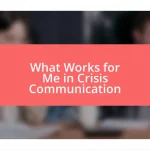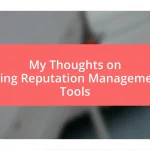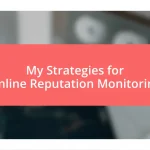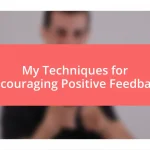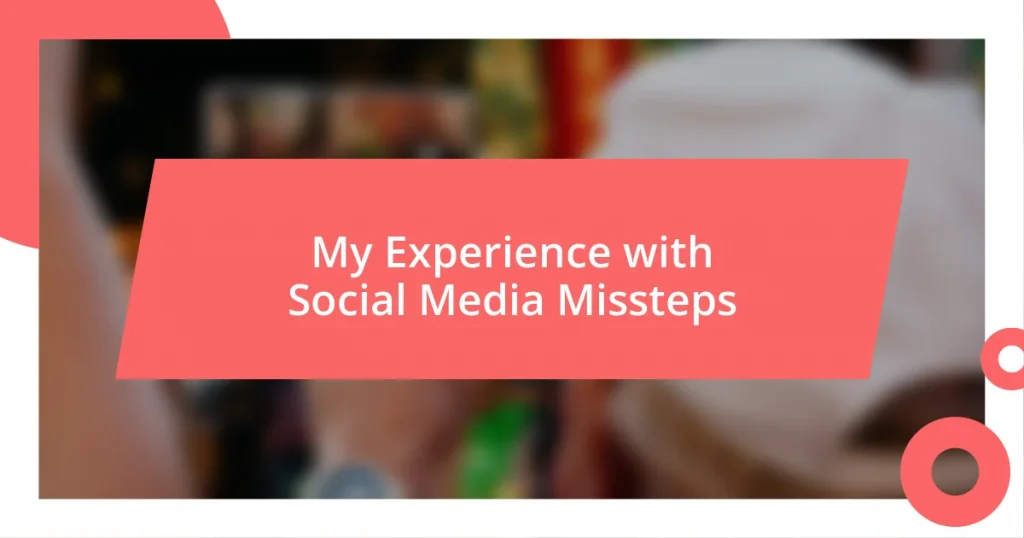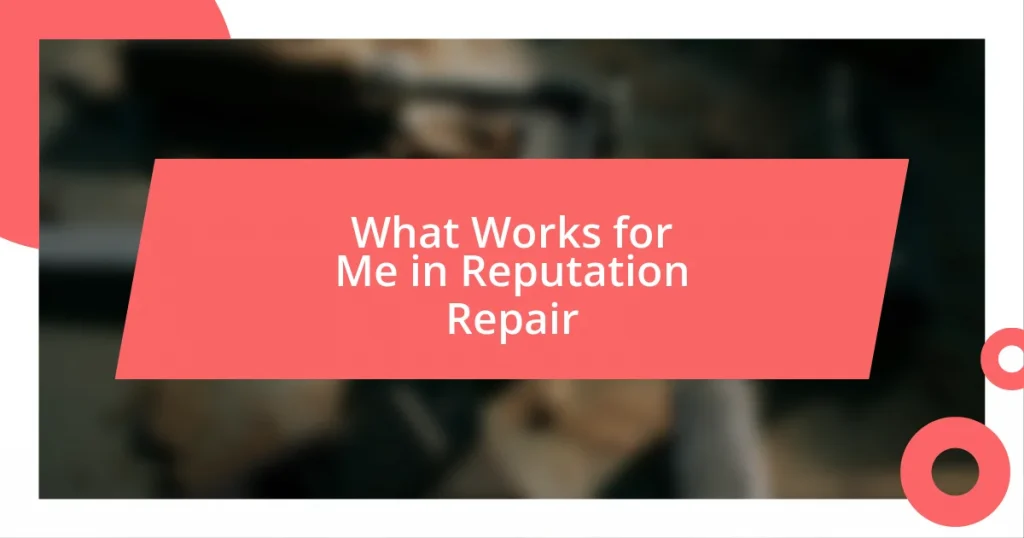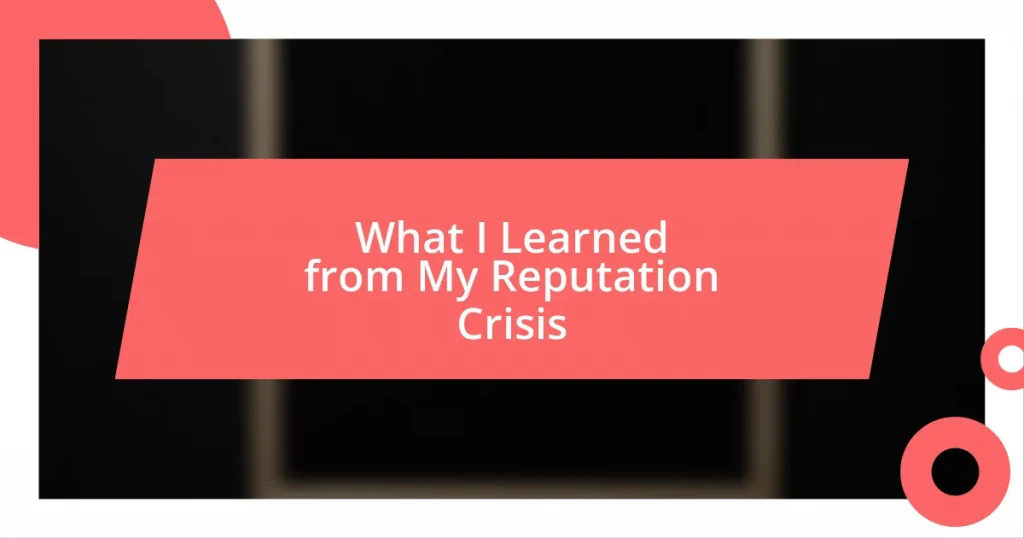Key takeaways:
- Social media missteps often arise from hasty interactions without fully understanding context, emphasizing the need for reflection before posting.
- Common pitfalls include oversharing, neglecting privacy settings, and failure to verify information, which can lead to misunderstandings and damage relationships.
- Building a responsible online presence involves aligning personal values with public posts, engaging meaningfully with the audience, and embracing transparency about mistakes to foster connections.
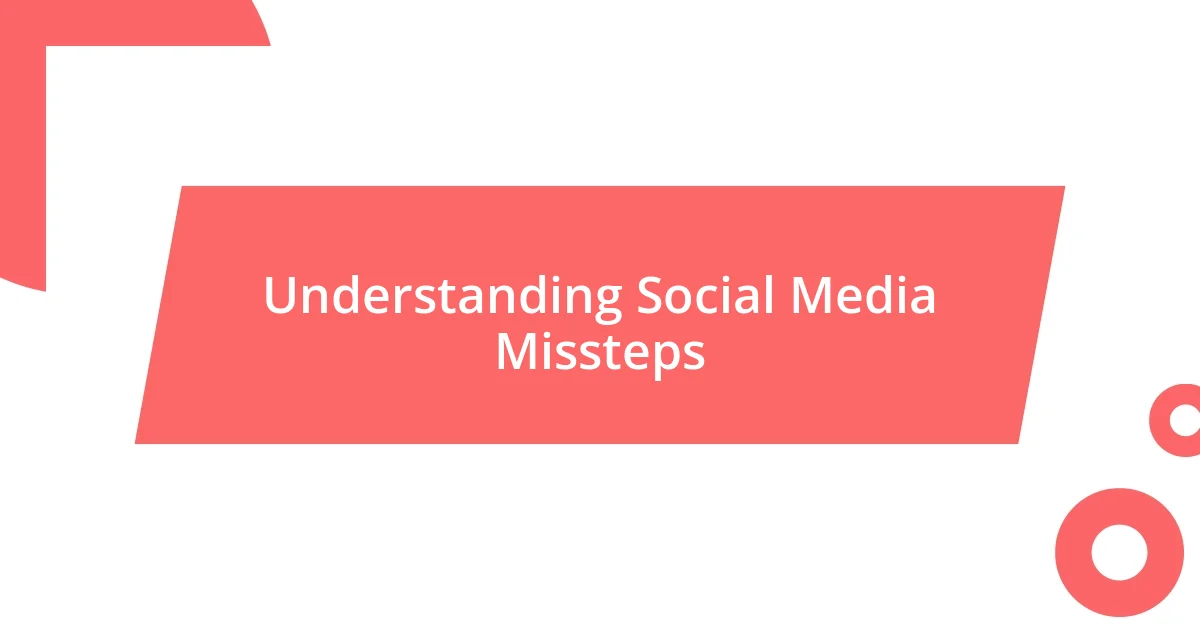
Understanding Social Media Missteps
Social media missteps can happen to anyone, often in the blink of an eye. I recall a moment when I hastily responded to a comment without considering the full context. The feeling of realizing I’d misinterpreted the intent was like a punch to the gut – how often do we rush to judgment based on just a portion of the story?
Navigating social media can feel like walking a tightrope. One wrong step, and your words can spiral out of control, leading to misunderstandings. Have you ever posted something only to regret it moments later? I know I have. The anxiety that sets in when you hit “post” and immediately wish you could take it back is all too real, highlighting how easily feelings can get hurt, even if that wasn’t the intention.
It’s essential to understand that what we share online often leaves a lasting impression. I learned this the hard way when a post I thought was humorous offended someone close to me, transforming a light laugh into a heavy silence. Reflecting on the emotional weight we carry in our digital interactions reminds us – do we truly think about the impact of our words, or do we carelessly toss out thoughts without considering their potential harm?
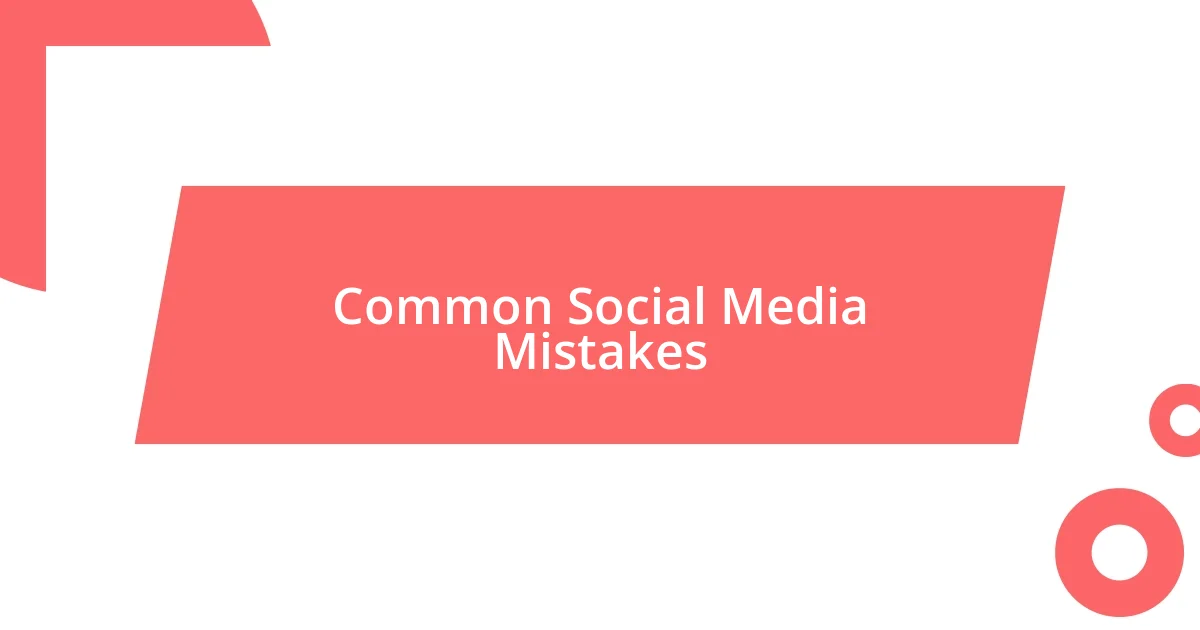
Common Social Media Mistakes
When it comes to social media, I often find that being overly casual can lead to unintentional blunders. I remember a time when I used slang in a professional context, thinking it showed a friendly vibe. What I didn’t anticipate was the confusion it caused among my colleagues, who didn’t resonate with the terminology. I learned that being too informal can sometimes backfire, especially when clarity is key.
Here are some common social media mistakes I’ve observed:
- Oversharing: While it’s tempting to share every detail of your life, not every moment deserves the spotlight.
- Neglecting privacy settings: I’ve seen too many people leave personal information vulnerable, which can lead to unwanted attention.
- Inconsistent posting: A sporadic posting schedule can lead to losing followers who expect regular updates.
- Ignoring feedback: When someone offers constructive criticism, it’s easy to brush it off, but engaging thoughtfully can strengthen your online presence.
- Getting too caught up in trends: I’ve jumped on trends that didn’t align with my personal brand and felt disconnected afterward.
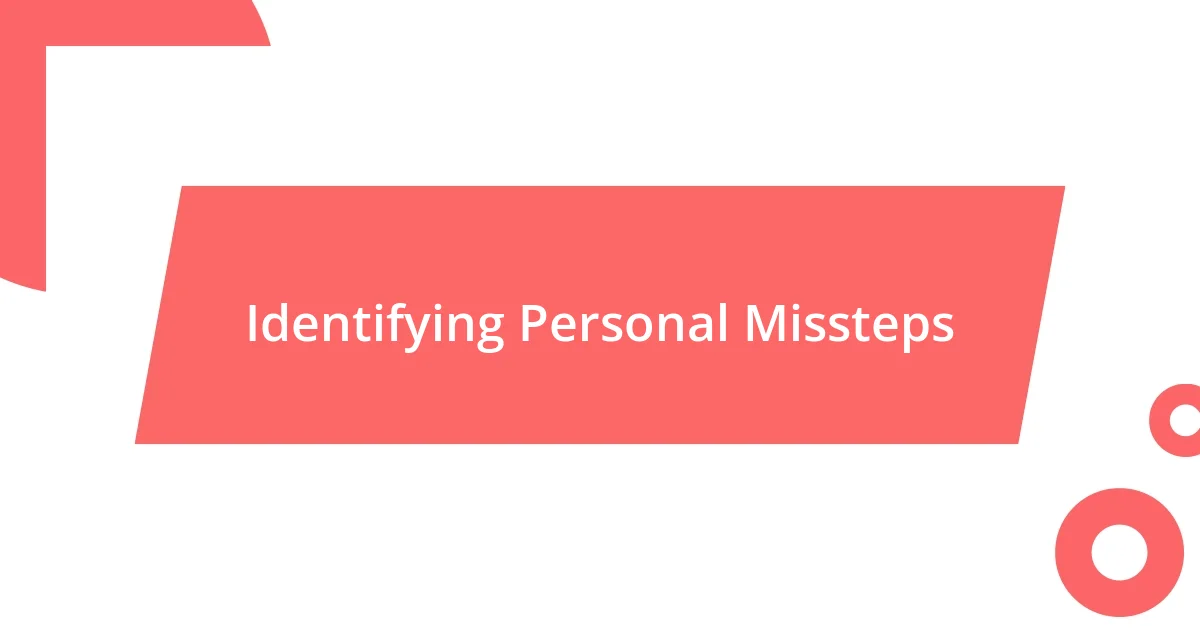
Identifying Personal Missteps
Identifying personal missteps in social media requires a moment of reflection. I had a time where I posted a strong opinion piece without fully analyzing the topic. The backlash was swift, leaving me feeling exposed and vulnerable. It was a tough lesson on the importance of understanding the nuances of a subject before I add my voice.
Another misstep I encountered was failing to double-check the sources of the information I shared. I remember retweeting a sensational article thinking it was credible, only to find out it was misleading. The embarrassment I felt was palpable, as it made me realize I’d inadvertently contributed to spreading misinformation. It’s crucial to verify facts before sharing; the impact can be more significant than we realize.
Lastly, I’ve learned that tone can easily be misinterpreted in written communication. Once, in a heated discussion, I used sarcasm, thinking it would lighten the mood. Instead, it escalated the situation, creating frustration among the participants. This experience taught me that clarity and empathy in my online interactions can greatly improve understanding, reducing the risk of miscommunication.
| Type of Misstep | Example |
|---|---|
| Opinion Sharing | Posted a strong opinion without full context |
| Information Verification | Shared misleading article without checking sources |
| Tone Misinterpretation | Used sarcasm in a serious discussion |
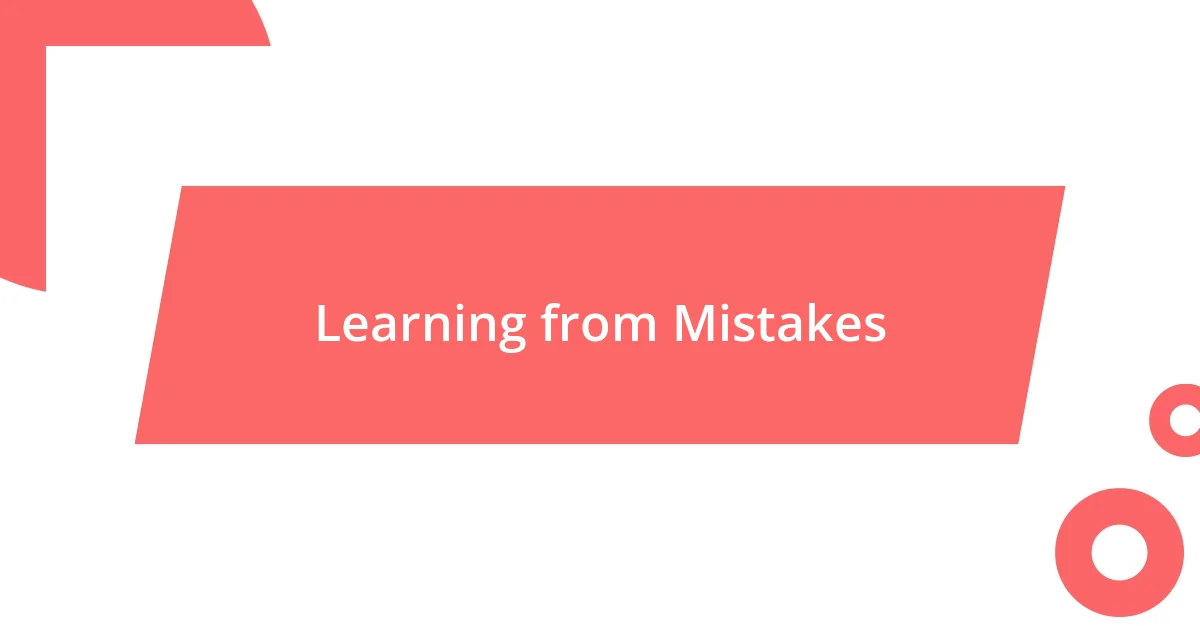
Learning from Mistakes
Learning from my mistakes has been an eye-opening experience that I value deeply. For example, after a cringe-worthy moment when I mistakenly tagged the wrong person in a sensitive post, I realized the importance of checking twice before sharing. The wave of apologies that followed taught me that attentiveness can prevent misunderstandings and preserve relationships.
Another lesson came from a post I crafted late at night, thinking it was clever and witty. The next morning, I woke up to a barrage of comments that made my stomach drop. I let a fleeting idea slip through without considering how it might be received. This taught me that the right timing can make all the difference; what feels funny at one moment might be taken quite differently a few hours later.
I’ve also reflected on the time I misinterpreted a comment as a personal attack and responded defensively. The tension that followed stayed with me longer than I’d like to admit. What if I had paused and asked for clarification instead? Learning to take a step back before reacting has since become a vital practice for me, showing that patience can turn a potential misstep into an opportunity for growth.
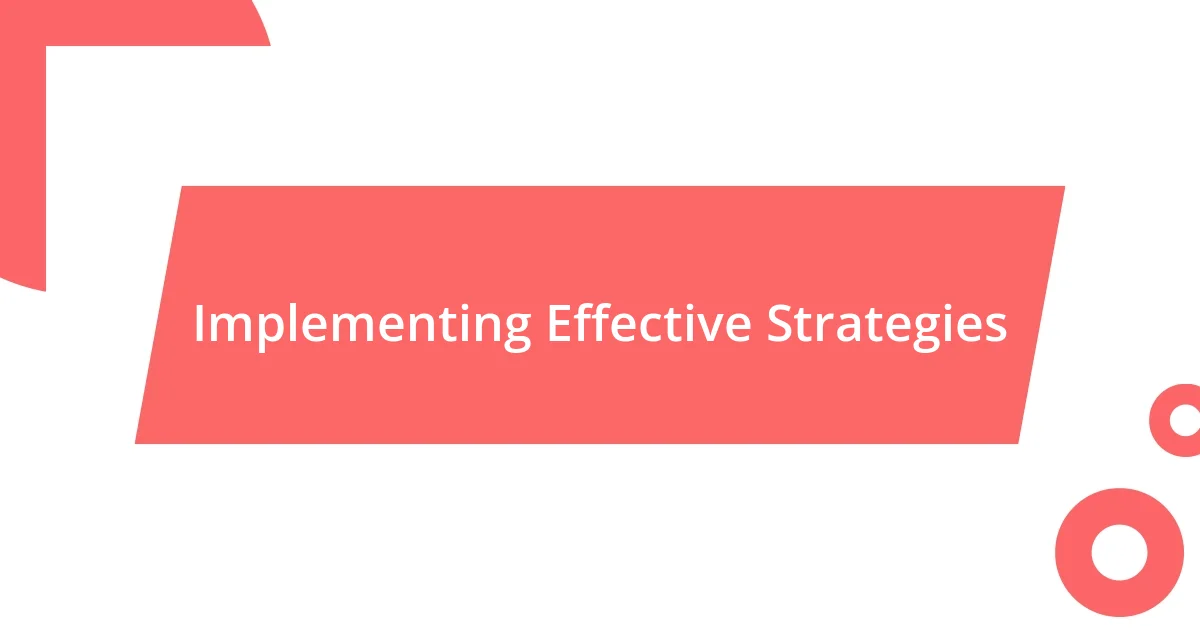
Implementing Effective Strategies
Implementing effective strategies in my social media journey has been transformative. For instance, I decided to create a content calendar to manage my posts better. Once, I was overwhelmed by inspiration and shared multiple posts in quick succession. The response was mixed, and I realized that pacing my content could cultivate a more engaged audience.
I also learned to adopt a more critical lens when engaging with trending topics. I remember joining a viral conversation without truly understanding the context, which led to a misstatement that spiraled into an online debate I hadn’t intended to start. By taking the time to digest the situation before commenting, I fostered a habit of thoughtful interaction which feels much more rewarding and prevents unnecessary drama.
Lastly, I discovered the significance of audience feedback. After a particularly charged post, I decided to invite my followers to share their opinions. That simple approach transformed my understanding of their perspectives, making my interactions more meaningful. Did you know that actively listening to your audience can reshape your content strategy? Embracing such strategies has not only improved my online presence but nurtured a genuine connection with those who follow me.
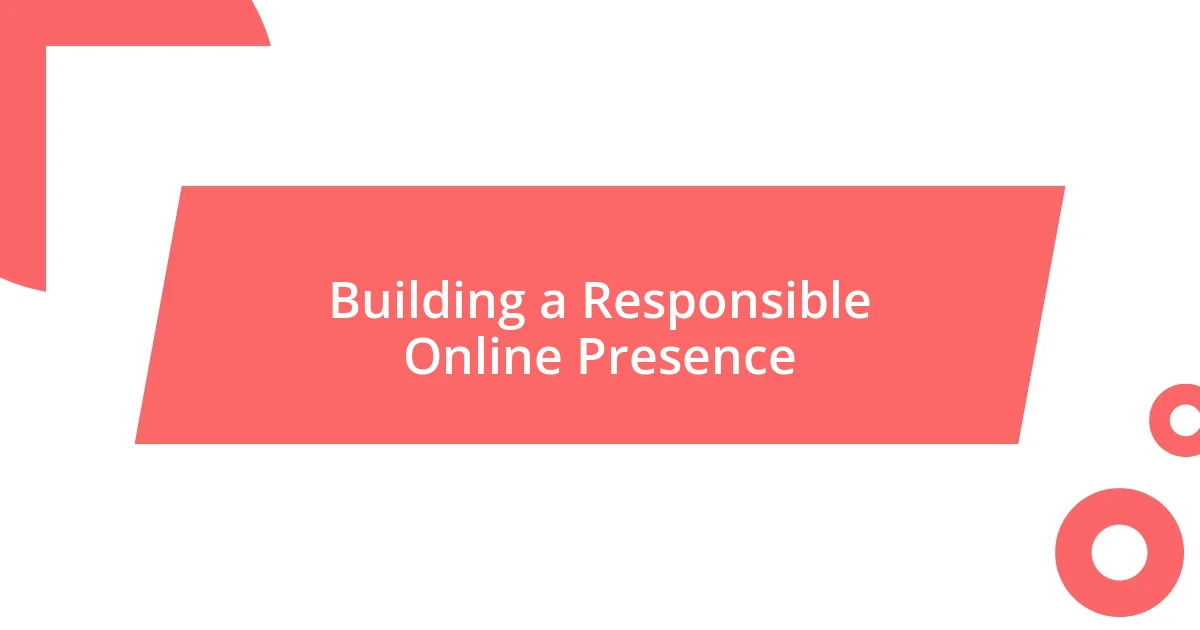
Building a Responsible Online Presence
Building a responsible online presence requires deliberate thought and awareness of the potential impact of our words. I remember a time when I shared a strong opinion about a controversial topic without fully grasping the nuances involved. The backlash was swift and intense, and it was a reminder that even well-meaning comments can cause ripples. Why didn’t I take a moment to research and reflect before hitting “post”? That experience cemented the idea that being informed is crucial in our digital interactions.
It’s also important to ensure that our online behavior aligns with our values. I once saw a friend share a meme that, while funny, perpetuated negative stereotypes. I hesitated but eventually spoke up about how the humor could be harmful. That moment deepened my appreciation for standing by what I believe in, even when it’s uncomfortable. Have you ever faced a dilemma about sharing something that might not align with your values? It can be tough, yet choosing authenticity over popularity pays off in spades.
Creating a responsible online presence doesn’t mean sacrificing creativity or genuine expression. A while back, I decided to share a personal story about overcoming a tough period in my life. To my surprise, the positive feedback was overwhelming, proving that vulnerability can foster connection. It’s a delicate balance—how do we share our true selves without crossing boundaries? I’ve found that openness, paired with empathy and respect for others’ experiences, can lead to richer conversations and a more supportive online community.
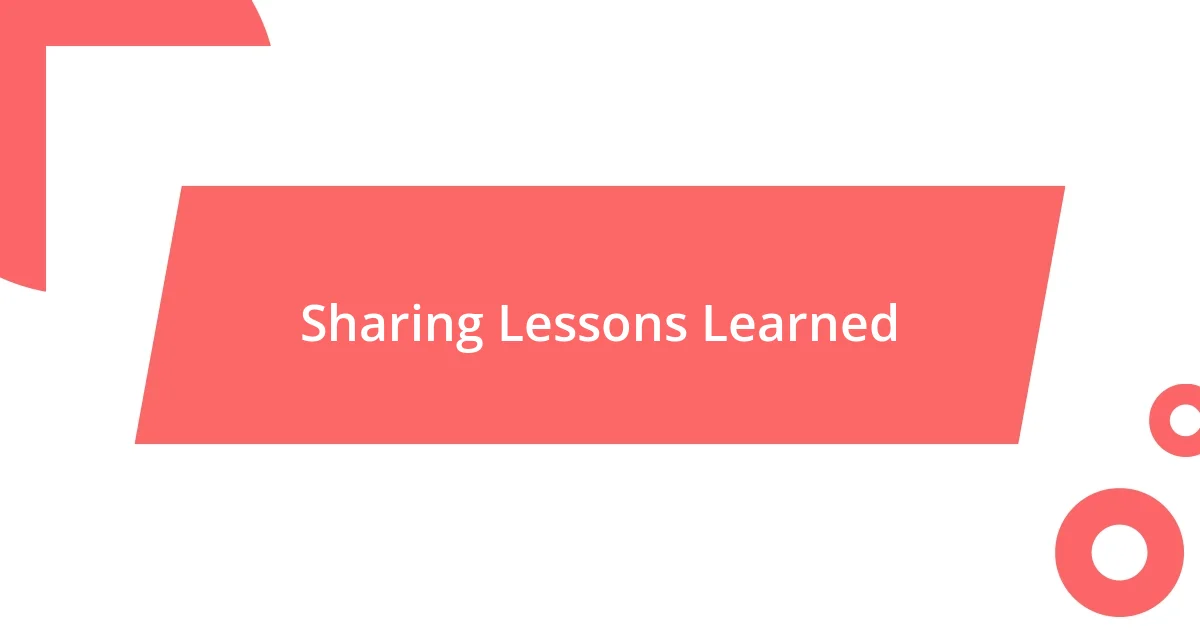
Sharing Lessons Learned
Sharing lessons learned from my social media missteps has been enlightening. For instance, I vividly remember a time when I jumped on a popular challenge without fully understanding its implications. The thrill of participating turned into a moment of regret when I realized the challenge had deeper, sensitive connotations that I overlooked. That experience taught me to pause and consider the broader context before engaging. Have you had a moment where you wished you could take a post back?
Listening to my audience emerged as one of the most valuable lessons. After an impulsive post that triggered unexpected reactions, I took the initiative to host an open Q&A session with my followers. Their insights were eye-opening and pushed me to rethink my approach to content creation. It was a true reminder that our audience’s voices matter, shaping not just what we share but also how we connect. How often do we take the time to engage meaningfully with those who follow us?
Finally, I’ve learned that transparency about my mistakes can foster deeper connections. I once had an online debate that spiraled out of control due to my stubbornness in holding onto my views. Instead of doubling down, I chose to share the experience publicly, reflecting on what I could have done differently. The feedback was surprisingly supportive, with many expressing their own struggles in navigating difficult conversations. It’s incredible how acknowledging our faults can create a safe space for others to do the same, don’t you think?

